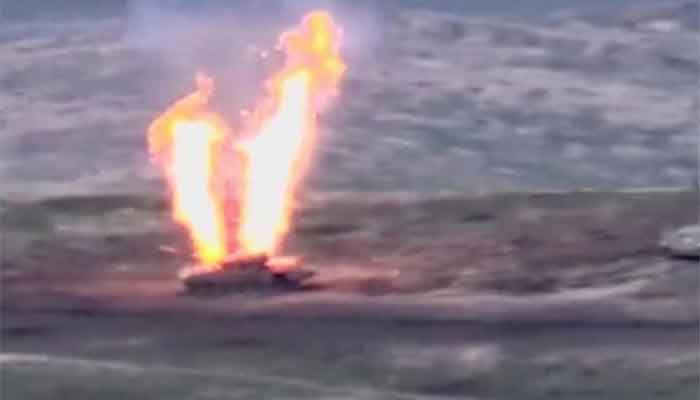
Desk Report
Publish: 28 Sep 2020, 12:31 pm

In the worst clashes between Armenia and Azerbaijan since 2016, at least 16 military members and several civilians were killed on Sunday, reigniting concern about stability in the South Caucasus, a pipeline corridor that carries oil and gas to world markets.
The clashes between the two former Soviet republics, which fought a war in the 1990s, were the latest flare-up of a long-running dispute over Nagorno-Karabakh, a disruptive territory ruled by ethnic Armenians within Azerbaijan, reports Reuters.
After Azerbaijan conducted an air and artillery assault early on Sunday, Nagorno-Karabakh said 16 of its servicemen were killed and more than 100 wounded. Martial law was proclaimed by Armenia and Nagorno-Karabakh and the male population was mobilised.
Azerbaijan, which also proclaimed martial law, stated that its forces responded to Armenian shelling and that Armenian shelling had killed five members of one family.
It also said it had taken control of up to seven villages by its troops. Initially, Nagorno-Karabakh denied that, but later admitted losing "some positions" and said that, without providing details, it had suffered a number of civilian casualties.
In a decades-old rivalry between majority Christian Armenia and predominantly Muslim Azerbaijan, the clashes triggered a flurry of diplomacy to minimize the current tensions, with Russia calling for an immediate truce and another regional force, Turkey, announcing it would help Azerbaijan.
President Donald Trump said the United States will work to end the violence on Sunday.
"We're looking at it very strongly," he told a news briefing. "We have a lot of good relationships in that area. We'll see if we can stop it."
In a statement, the US State Department condemned the abuse, calling for an immediate end to hostilities and any rhetoric or other acts that could escalate matters.
"In a declaration that hostilities could intensify into a wider war, US Democratic presidential candidate and former Vice President Joe Biden said, urging the Trump administration to press for more monitors along the ceasefire line and for Russia" to avoid cynically supplying both sides with weapons.
Pipelines shipping Azerbaijan's Caspian oil and natural gas to the world pass near Nagorno-Karabakh. In July, after Azerbaijan threatened to attack Armenia's nuclear power plant as a potential retaliation, Armenia also warned about security threats in the South Caucasus.
In a war that broke out as the Soviet Union dissolved in 1991, Nagorno-Karabakh broke away from Azerbaijan.
Although a ceasefire was signed in 1994, Azerbaijan and Armenia still accuse each other of attacks around Nagorno-Karabakh and along the separate Azeri-Armenian frontier after thousands of people were killed and many more displaced.
Armenian right-wing activists said that an ethnic Armenian woman and child had also been killed in Sunday's clashes.
INTERNATIONAL DIPLOMACY
Armenia said Azeri forces had attacked civilian targets including Nagorno-Karabakh's capital, Stepanakert, and promised a "proportionate response".
"We stay strong next to our army to protect our motherland from Azeri invasion," Armenian Prime Minister Nikol Pashinyan wrote on Twitter.
Azerbaijan denied a statement by the Armenian Ministry of Defense stating that Azeri helicopters and tanks were lost and accused Armenian forces of launching "deliberate and targeted" attacks along the front line.
"We defend our territory, our cause is right!" Azerbaijan's president, Ilham Aliyev, said in an address to the nation.
Turkey said it talked to representatives of the Minsk community that mediates between Azerbaijan and Armenia. Co-presidents include Russia, France and the United States.
Russian President Vladimir Putin spoke to Pashinyan by phone, but no specifics of the conversation were available, and Aliyev was spoken to by Turkish President Tayyip Erdogan.
Erdogan, promising support for traditional ally Azerbaijan, said Armenia was "the biggest threat to peace in the region" and called on "the entire world to stand with Azerbaijan in their battle against invasion and cruelty."
Pashinyan hit back, asking the international community to ensure that the dispute does not include Turkey.
The European Union and the Organization for Security and Cooperation in Europe (OSCE) urged all parties, as did Pope Francis, to suspend military action and to return to negotiations.
At least 200 people were killed in a flare-up of the conflict between Armenia and Azerbaijan in April 2016. At least 16 people were killed in clashes in July.
Subscribe Shampratik Deshkal Youtube Channel
© 2024 Shampratik Deshkal All Rights Reserved. Design & Developed By Root Soft Bangladesh